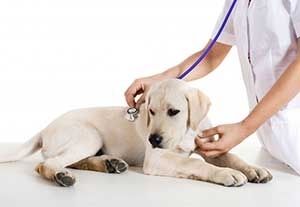Pet Examination

Our pets are a part of our family, and every responsible owner wants to ensure that their pets are in the very best of health. The majority of conditions that animals are susceptible to have no obvious symptoms early on. Once they do present themselves, many pets may already be suffering and may then require extensive medical assistance. Your pet may not be able to tell you what is wrong, but our examinations aim to discover the source of any problem, or indeed prevent them before they arise.
To help keep your pet in optimum health, we recommend a full nose to tail wellness examination at least once a year. If you have recently purchased or adopted a pet , then we strongly recommend that you book an appointment for their first examination within the first few weeks of ownership. Some breeders or animal shelters require an examination within two weeks of picking your pet up. Younger animals are more vulnerable to illness and this examination will allow us to reassure you of their health and give us a starting point for their medical records.
Your pet’s physical examination will include some or all of the following:
To help keep your pet in optimum health, we recommend a full nose to tail wellness examination at least once a year. If you have recently purchased or adopted a pet , then we strongly recommend that you book an appointment for their first examination within the first few weeks of ownership. Some breeders or animal shelters require an examination within two weeks of picking your pet up. Younger animals are more vulnerable to illness and this examination will allow us to reassure you of their health and give us a starting point for their medical records.
Your pet’s physical examination will include some or all of the following:
- Abdomen and anal sac examination to check for swelling, bloating or any other abnormalities.
- Bellybutton check in puppies or kittens to ensure there is no hernia.
- Examining the condition of the coat and skin - this can indicate the overall health of the animal.
- Checking the genital area for any malformation.
- Examination of the heart and lungs, checking for any irregularities such as heart murmurs.
- Manipulation of the joints to ensure they are mobile and functioning correctly.
- Examination of the ear canals and ear flaps for parasites, infection, growths or tumors.
- Weight check, where dietary or exercise recommendations may also be made.
- Eye exam. Your veterinarian will check for discharge, redness, and abnormal responses to light. They will also examine the optic nerve in the back of the eye.
- Full dental check up including looking for any signs of periodontal disease.
- Older pets may require blood tests to check their liver, kidneys and other internal organs.
- If your pet requires any routine vaccinations or treatment, this will usually be taken care of at this time.
- Fecal testing may also be required and you may be asked to provide a stool sample from your pet. Fecal testing is vital to allow your veterinarian to check for internal parasites which live in your pets’ gastrointestinal tract. These parasites can be deadly in pets and cause health problems for humans. Examples include roundworms and hookworms.
As well as a physical examination, we will also want to talk to you about your pet’s overall well-being. This will include asking about their usual behavior and disposition, their water intake, diet and eating habits, urinating and bowel regularities and activity levels. This will allow us to paint an overall picture of your pets’ health to compliment the physical examination. If this is your first visit to us and we do not detect any underlying health concerns, we can use this information as a basis to represent your pet in a normal state of health. If this is a subsequent visit then we can compare this to their base report and check for any significant changes, which could be early indicators of medical problems.
Make sure that your pet is as healthy as you are by booking a medical examination for them today.











